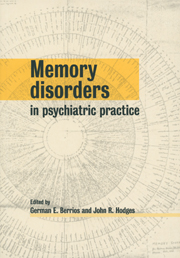3 - The concept of metamemory: cognitive, developmental, and clinical issues
from Part I
Published online by Cambridge University Press: 06 January 2010
Summary
In its most basic sense, the term ‘metamemory’ refers to cognition about memory – thinking about how, why and whether memory works. More elaborated views of metamemory include knowledge of memory functioning, awareness of current memory processes, beliefs about memory skills, and even memory-related affect. In this chapter, both an overview of an elaborated concept of metamemory and a brief review of literature pertaining to the assessment of it are provided. This elaborated view of metamemory is especially useful when considering developmental issues (e.g. how memory normally changes – grows and declines – across the lifespan) and clinical concerns (e.g. how memory disorders are developed, supported and remedied).
Context of the concept of metamemory
In recent decades, the concept of metamemory has been the topic of considerable attention in a variety of neighbouring domains of psychological and psychiatric research and practice. The range of both the substantive interests and the theoretical perspectives of the researchers is notable, for it spans numerous ‘disciplines’ of the psychological sciences. Five such disciplines are noted here. First, cognitive psychologists have examined metacognition as bridging and reflecting such processes as self-monitoring, decision making, learning and memory, motivation, plans and strategies, and cognitive development (see Metcalfe & Shimamura, 1994). For example, Nelson and Narens (1990, 1994) have developed a framework of metamemory in which monitoring and control processes interact during the acquisition, retention, and retrieval phases of memory. Secondly, neuropsychologists have examined metacognition as it bridges cognitive psychology, neuroscience, and clinical neuropsychology.
Keywords
- Type
- Chapter
- Information
- Memory Disorders in Psychiatric Practice , pp. 47 - 57Publisher: Cambridge University PressPrint publication year: 2000
- 3
- Cited by



